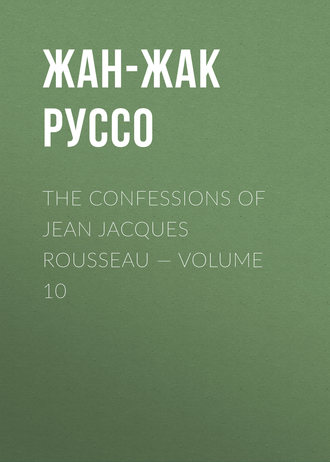
Жан-Жак Руссо
The Confessions of Jean Jacques Rousseau — Volume 10
One day, whilst we were still upon the very best terms, he received me so coldly and in a manner so different from that which was customary to him, that after having given him an opportunity to explain, and even having begged him to do it, I left his house with a resolution, in which I have persevered, never to return to it again; for I am seldom seen where I have been once ill received, and in this case there was no Diderot who pleaded for M. de Joinville. I vainly endeavored to discover what I had done to offend him; I could not recollect a circumstance at which he could possibly have taken offence. I was certain of never having spoken of him or his in any other than in the most honorable manner; for he had acquired my friendship, and besides my having nothing but favorable things to say of him, my most inviolable maxim has been that of never speaking but in an honorable manner of the houses I frequented.
At length, by continually ruminating. I formed the following conjecture: the last time we had seen each other, I had supped with him at the apartment of some girls of his acquaintance, in company with two or three clerks in the office of foreign affairs, very amiable men, and who had neither the manner nor appearance of libertines; and on my part, I can assert that the whole evening passed in making melancholy reflections on the wretched fate of the creatures with whom we were. I did not pay anything, as M. de Joinville gave the supper, nor did I make the girls the least present, because I gave them not the opportunity I had done to the padoana of establishing a claim to the trifle I might have offered, We all came away together, cheerfully and upon very good terms. Without having made a second visit to the girls, I went three or four days afterwards to dine with M. de Joinville, whom I had not seen during that interval, and who gave me the reception of which I have spoken. Unable to suppose any other cause for it than some misunderstanding relative to the supper, and perceiving he had no inclination to explain, I resolved to visit him no longer, but I still continued to send him my works: he frequently sent me his compliments, and one evening, meeting him in the green-room of the French theatre, he obligingly reproached me with not having called to see him, which, however, did not induce me to depart from my resolution. Therefore this affair had rather the appearance of a coolness than a rupture. However, not having heard of nor seen him since that time, it would have been too late after an absence of several years, to renew my acquaintance with him. It is for this reason M. de Joinville is not named in my list, although I had for a considerable time frequented his house.
I will not swell my catalogue with the names of many other persons with whom I was or had become less intimate, although I sometimes saw them in the country, either at my own house or that of some neighbor, such for instance as the Abbes de Condillac and De Malby, M. de Mairan, De la Lalive, De Boisgelou, Vatelet, Ancelet, and others. I will also pass lightly over that of M. de Margency, gentleman in ordinary of the king, an ancient member of the 'Coterie Holbachique', which he had quitted as well as myself, and the old friend of Madam d'Epinay from whom he had separated as I had done; I likewise consider that of M. Desmahis, his friend, the celebrated but short-lived author of the comedy of the Impertinent, of much the same importance. The first was my neighbor in the country, his estate at Margency being near to Montmorency. We were old acquaintances, but the neighborhood and a certain conformity of experience connected us still more. The last died soon afterwards. He had merit and even wit, but he was in some degree the original of his comedy, and a little of a coxcomb with women, by whom he was not much regretted.
I cannot, however, omit taking notice of a new correspondence I entered into at this period, which has had too much influence over the rest of my life not to make it necessary for me to mark its origin. The person in question is De Lamoignon de Malesherbes of the 'Cour des aides', then censor of books, which office he exercised with equal intelligence and mildness, to the great satisfaction of men of letters. I had not once been to see him at Paris; yet I had never received from him any other than the most obliging condescensions relative to the censorship, and I knew that he had more than once very severely reprimanded persons who had written against me. I had new proofs of his goodness upon the subject of the edition of Eloisa. The proofs of so great a work being very expensive from Amsterdam by post, he, to whom all letters were free, permitted these to be addressed to him, and sent them to me under the countersign of the chancellor his father. When the work was printed he did not permit the sale of it in the kingdom until, contrary to my wishes an edition had been sold for my benefit. As the profit of this would on my part have been a theft committed upon Rey, to whom I had sold the manuscript, I not only refused to accept the present intended me, without his consent, which he very generously gave, but persisted upon dividing with him the hundred pistoles (a thousand livres—forty pounds), the amount of it but of which he would not receive anything. For these hundred pistoles I had the mortification, against which M. de Malesherbes had not guarded me, of seeing my work horribly mutilated, and the sale of the good edition stopped until the bad one was entirely disposed of.
I have always considered M. de Malesherbes as a man whose uprightness was proof against every temptation. Nothing that has happened has even made me doubt for a moment of his probity; but, as weak as he is polite, he sometimes injures those he wishes to serve by the excess of his zeal to preserve them from evil. He not only retrenched a hundred pages in the edition of Paris, but he made another retrenchment, which no person but the author could permit himself to do, in the copy of the good edition he sent to Madam de Pompadour. It is somewhere said in that work that the wife of a coal-heaver is more respectable than the mistress of a prince. This phrase had occurred to me in the warmth of composition without any application. In reading over the work I perceived it would be applied, yet in consequence of the very imprudent maxim I had adopted of not suppressing anything, on account of the application which might be made, when my conscience bore witness to me that I had not made them at the time I wrote, I determined not to expunge the phrase, and contented myself with substituting the word Prince to King, which I had first written. This softening did not seem sufficient to M. de Malesherbes: he retrenched the whole expression in a new sheet which he had printed on purpose and stuck in between the other with as much exactness as possible in the copy of Madam de Pompadour. She was not ignorant of this manoeuvre. Some good-natured people took the trouble to inform her of it. For my part, it was not until a long time afterwards, and when I began to feel the consequences of it, that the matter came to my knowledge.
Is not this the origin of the concealed but implacable hatred of another lady who was in a like situation, without my knowing it, or even being acquainted with her person when I wrote the passage? When the book was published the acquaintance was made, and I was very uneasy. I mentioned this to the Chevalier de Lorenzy, who laughed at me, and said the lady was so little offended that she had not even taken notice of the matter. I believed him, perhaps rather too lightly, and made myself easy when there was much reason for my being otherwise.
At the beginning of the winter I received an additional mark of the goodness of M. de Malesherbes of which I was very sensible, although I did not think proper to take advantage of it. A place was vacant in the 'Journal des Savans'. Margency wrote to me, proposing to me the place, as from himself. But I easily perceived from the manner of the letter that he was dictated to and authorized; he afterwards told me he had been desired to make me the offer. The occupations of this place were but trifling. All I should have had to do would have been to make two abstracts a month, from the books brought to me for that purpose, without being under the necessity of going once to Paris, not even to pay the magistrate a visit of thanks. By this employment I should have entered a society of men of letters of the first merit; M. de Mairan, Clairaut, De Guignes and the Abbe Barthelemi, with the first two of whom I had already made an acquaintance, and that of the two others was very desirable. In fine, for this trifling employment, the duties of which I might so commodiously have discharged, there was a salary of eight hundred livres (thirty-three pounds); I was for a few hours undecided, and this from a fear of making Margency angry and displeasing M. de Malesherbes. But at length the insupportable constraint of not having it in my power to work when I thought proper, and to be commanded by time; and moreover the certainty of badly performing the functions with which I was to charge myself, prevailed over everything, and determined me to refuse a place for which I was unfit. I knew that my whole talent consisted in a certain warmth of mind with respect to the subjects of what I had to treat, and that nothing but the love of that which was great, beautiful and sublime, could animate my genius. What would the subjects of the extracts I should have had to make from books, or even the books themselves, have signified to me? My indifference about them would have frozen my pen, and stupefied my mind. People thought I could make a trade of writing, as most of the other men of letters did, instead of which I never could write but from the warmth of imagination. This certainly was not necessary for the 'Journal des Savans'. I therefore wrote to Margency a letter of thanks, in the politest terms possible, and so well explained to him my reasons, that it was not possible that either he or M. de Malesherbes could imagine there was pride or ill-humor in my refusal. They both approved of it without receiving me less politely, and the secret was so well kept that it was never known to the public.
The proposition did not come in a favorable moment. I had some time before this formed the project of quitting literature, and especially the trade of an author. I had been disgusted with men of letters by everything that had lately befallen me, and had learned from experience that it was impossible to proceed in the same track without having some connections with them. I was not much less dissatisfied with men of the world, and in general with the mixed life I had lately led, half to myself and half devoted to societies for which I was unfit. I felt more than ever, and by constant experience, that every unequal association is disadvantageous to the weaker person. Living with opulent people, and in a situation different from that I had chosen, without keeping a house as they did, I was obliged to imitate them in many things; and little expenses, which were nothing to their fortunes, were for me not less ruinous than indispensable. Another man in the country-house of a friend, is served by his own servant, as well at table as in his chamber; he sends him to seek for everything he wants; having nothing directly to do with the servants of the house, not even seeing them, he gives them what he pleases, and when he thinks proper; but I, alone, and without a servant, was at the mercy of the servants of the house, of whom it was necessary to gain the good graces, that I might not have much to suffer; and being treated as the equal of their master, I was obliged to treat them accordingly, and better than another would have done, because, in fact, I stood in greater need of their services. This, where there are but few domestics, may be complied with; but in the houses I frequented there were a great number, and the knaves so well understood their interests that they knew how to make me want the services of them all successively. The women of Paris, who have so much wit, have no just idea of this inconvenience, and in their zeal to economize my purse they ruined me. If I supped in town, at any considerable distance from my lodgings, instead of permitting me to send for a hackney coach, the mistress of the house ordered her horses to be put to and sent me home in her carriage. She was very glad to save me the twenty-four sous (shilling) for the fiacre, but never thought of the half-crown I gave to her coachman and footman. If a lady wrote to me from Paris to the Hermit age or to Montmorency, she regretted the four sous (two pence) the postage of the letter would have cost me, and sent it by one of her servants, who came sweating on foot, and to whom I gave a dinner and half a crown, which he certainly had well earned. If she proposed to me to pass with her a week or a fortnight at her country-house, she still said to herself, "It will be a saving to the poor man; during that time his eating will cost him nothing." She never recollected that I was the whole time idle, that the expenses of my family, my rent, linen and clothes were still going on, that I paid my barber double that it cost me more being in her house than in my own, and although I confined my little largesses to the house in which I customarily lived, that these were still ruinous to me. I am certain I have paid upwards of twenty-five crowns in the house of Madam d'Houdetot, at Raubonne, where I never slept more than four or five times, and upwards of a thousand livres (forty pounds) as well at Epinay as at the Chevrette, during the five or six years I was most assiduous there. These expenses are inevitable to a man like me, who knows not how to provide anything for himself, and cannot support the sight of a lackey who grumbles and serves him with a sour look. With Madam Dupin, even where I was one of the family, and in whose house I rendered many services to the servants, I never received theirs but for my money. In course of time it was necessary to renounce these little liberalities, which my situation no longer permitted me to bestow, and I felt still more severely the inconvenience of associating with people in a situation different from my own.
Had this manner of life been to my taste, I should have been consoled for a heavy expense, which I dedicated to my pleasures; but to ruin myself at the same time that I fatigued my mind, was insupportable, and I had so felt the weight of this, that, profiting by the interval of liberty I then had, I was determined to perpetuate it, and entirely to renounce great companies, the composition of books, and all literary concerns, and for the remainder of my days to confine myself to the narrow and peaceful sphere in which I felt I was born to move.
The produce of this letter to D'Alembert, and of the New Elosia, had a little improved the state of my finances, which had been considerably exhausted at the Hermitage. Emilius, to which, after I had finished Eloisa, I had given great application, was in forwardness, and the produce of this could not be less than the sum of which I was already in possession. I intended to place this money in such a manner as to produce me a little annual income, which, with my copying, might be sufficient to my wants without writing any more. I had two other works upon the stocks. The first of these was my 'Institutions Politiques'. I examined the state of this work, and found it required several years' labor. I had not courage enough to continue it, and to wait until it was finished before I carried my intentions into execution. Therefore, laying the book aside, I determined to take from it all I could, and to burn the rest; and continuing this with zeal without interrupting Emilius, I finished the 'Contrat Social'.
The dictionary of music now remained. This was mechanical, and might be taken up at any time; the object of it was entirely pecuniary. I reserved to myself the liberty of laying it aside, or of finishing it at my ease, according as my other resources collected should render this necessary or superfluous. With respect to the 'Morale Sensitive', of which I had made nothing more than a sketch, I entirely gave it up.
As my last project, if I found I could not entirely do without copying, was that of removing from Paris, where the affluence of my visitors rendered my housekeeping expensive, and deprived me of the time I should have turned to advantage to provide for it; to prevent in my retirement the state of lassitude into which an author is said to fall when he has laid down his pen, I reserved to myself an occupation which might fill up the void in my solitude without tempting me to print anything more. I know not for what reason they had long tormented me to write the memoirs of my life. Although these were not until that time interesting as to the facts, I felt they might become so by the candor with which I was capable of giving them, and I determined to make of these the only work of the kind, by an unexampled veracity, that, for once at least, the world might see a man such as he internally was. I had always laughed at the false ingenuousness of Montaigne, who, feigning to confess his faults, takes great care not to give himself any, except such as are amiable; whilst I, who have ever thought, and still think myself, considering everything, the best of men, felt there is no human being, however pure he maybe, who does not internally conceal some odious vice. I knew I was described to the public very different from what I really was, and so opposite, that notwithstanding my faults, all of which I was determined to relate, I could not but be a gainer by showing myself in my proper colors. This, besides, not being to be done without setting forth others also in theirs and the work for the same reason not being of a nature to appear during my lifetime, and that of several other persons, I was the more encouraged to make my confession, at which I should never have to blush before any person. I therefore resolved to dedicate my leisure to the execution of this undertaking, and immediately began to collect such letters and papers as might guide or assist my memory, greatly regretting the loss of all I had burned, mislaid and destroyed.
The project of absolute retirement, one of the most reasonable I had ever formed, was strongly impressed upon my mind, and for the execution of it I was already taking measures, when Heaven, which prepared me a different destiny, plunged me into a another vortex.
Montmorency, the ancient and fine patrimony of the illustrious family of that name, was taken from it by confiscation. It passed by the sister of Duke Henry, to the house of Conde, which has changed the name of Montmorency to that of Enguien, and the duchy has no other castle than an old tower, where the archives are kept, and to which the vassals come to do homage. But at Montmorency, or Enguien, there is a private house, built by Crosat, called 'le pauvre', which having the magnificence of the most superb chateaux, deserves and bears the name of a castle. The majestic appearance of this noble edifice, the view from it, not equalled perhaps in any country; the spacious saloon, painted by the hand of a master; the garden, planted by the celebrated Le Notre; all combined to form a whole strikingly majestic, in which there is still a simplicity that enforces admiration. The Marechal Duke de Luxembourg who then inhabited this house, came every year into the neighborhood where formerly his ancestors were the masters, to pass, at least, five or six weeks as a private inhabitant, but with a splendor which did not degenerate from the ancient lustre of his family. On the first journey he made to it after my residing at Montmorency, he and his lady sent to me a valet de chambre, with their compliments, inviting me to sup with them as often as it should be agreeable to me; and at each time of their coming they never failed to reiterate the same compliments and invitation. This called to my recollection Madam Beuzenval sending me to dine in the servants' hall. Times were changed; but I was still the same man. I did not choose to be sent to dine in the servants' hall, and was but little desirous of appearing at the table of the great I should have been much better pleased had they left me as I was, without caressing me and rendering me ridiculous. I answered politely and respectfully to Monsieur and Madam de Luxembourg, but I did not accept their offers, and my indisposition and timidity, with my embarrassment in speaking; making me tremble at the idea alone of appearing in an assembly of people of the court. I did not even go to the castle to pay a visit of thanks, although I sufficiently comprehended this was all they desired, and that their eager politeness was rather a matter of curiosity than benevolence.
However, advances still were made, and even became more pressing. The Countess de Boufflers, who was very intimate with the lady of the marechal, sent to inquire after my health, and to beg I would go and see her. I returned her a proper answer, but did not stir from my house. At the journey of Easter, the year following, 1759, the Chevalier de Lorenzy, who belonged to the court of the Prince of Conti, and was intimate with Madam de Luxembourg, came several times to see me, and we became acquainted; he pressed me to go to the castle, but I refused to comply. At length, one afternoon, when I least expected anything of the kind, I saw coming up to the house the Marechal de Luxembourg, followed by five or six persons. There was now no longer any means of defence; and I could not, without being arrogant and unmannerly, do otherwise than return this visit, and make my court to Madam la Marechale, from whom the marechal had been the bearer of the most obliging compliments to me. Thus, under unfortunate auspices, began the connections from which I could no longer preserve myself, although a too well-founded foresight made me afraid of them until they were made.
I was excessively afraid of Madam de Luxembourg. I knew, she was amiable as to manner. I had seen her several times at the theatre, and with the Duchess of Boufflers, and in the bloom of her beauty; but she was said to be malignant; and this in a woman of her rank made me tremble. I had scarcely seen her before I was subjugated. I thought her charming, with that charm proof against time and which had the most powerful action upon my heart. I expected to find her conversation satirical and full of pleasantries and points. It was not so; it was much better. The conversation of Madam de Luxembourg is not remarkably full of wit; it has no sallies, nor even finesse; it is exquisitely delicate, never striking, but always pleasing. Her flattery is the more intoxicating as it is natural; it seems to escape her involuntarily, and her heart to overflow because it is too full. I thought I perceived, on my first visit, that notwithstanding my awkward manner and embarrassed expression, I was not displeasing to her. All the women of the court know how to persuade us of this when they please, whether it be true or not, but they do not all, like Madam de Luxembourg, possess the art of rendering that persuasion so agreeable that we are no longer disposed ever to have a doubt remaining. From the first day my confidence in her would have been as full as it soon afterwards became, had not the Duchess of Montmorency, her daughter-in-law, young, giddy, and malicious also, taken it into her head to attack me, and in the midst of the eulogiums of her mamma, and feigned allurements on her own account, made me suspect I was only considered by them as a subject of ridicule.







